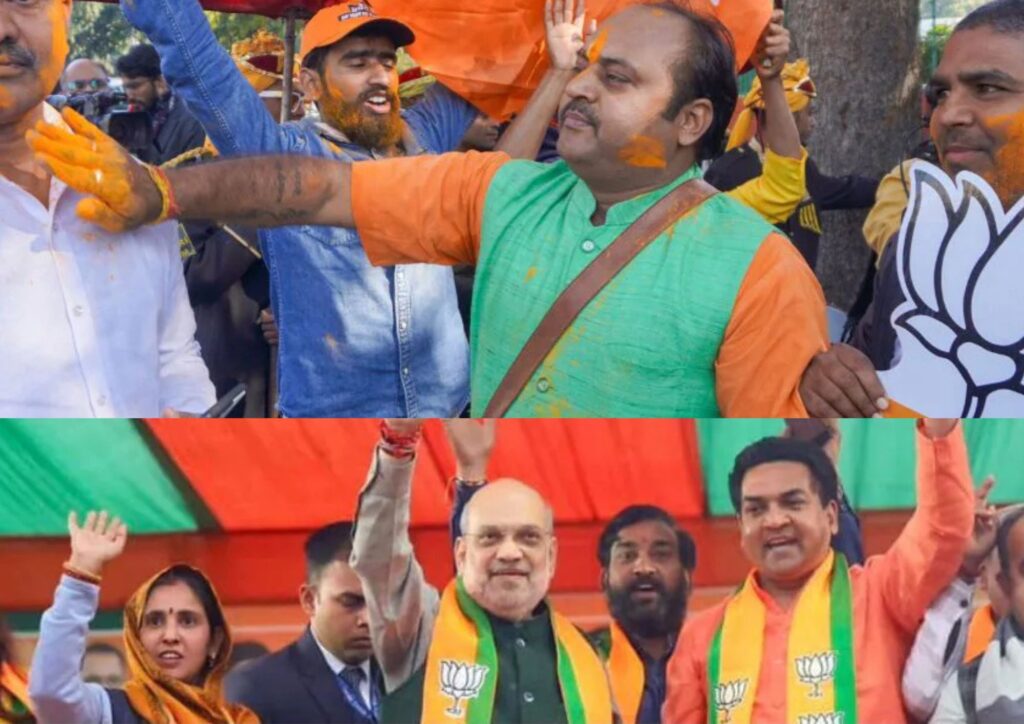In a historic political shift, the Bharatiya Janata Party (BJP) has secured a decisive victory in the 2025 Delhi Legislative Assembly elections, reclaiming power in the national capital after nearly three decades. The BJP’s win of 48 out of the 70 assembly seats, surpasses the majority mark of 36 seats. The Aam Aadmi Party (AAP), which had governed Delhi since 2015, secured 22 seats, while the Indian National Congress failed to win any seats.
Key Victories and Defeats:
- Parvesh Verma’s Triumph: In a significant upset, BJP’s Parvesh Verma defeated AAP’s national convener and former Chief Minister Arvind Kejriwal in the New Delhi constituency by a margin of over 4,000 votes. This constituency has historically been a stronghold for AAP, making Verma’s victory particularly noteworthy.
- Manish Sisodia’s Loss: Former Deputy Chief Minister Manish Sisodia faced defeat in the Jangpura constituency, losing to BJP’s Tarvinder Singh Marwah. Sisodia’s loss marks a significant setback for AAP, given his prominent role in the previous administration.
- Atishi’s Victory: In contrast, AAP’s Atishi Marlena retained her seat in the Kalkaji constituency, defeating BJP’s Ramesh Bidhuri by a narrow margin. Atishi’s win provides a silver lining for AAP amidst an otherwise challenging election outcome.
Potential Chief Ministerial Candidates:
With the BJP’s victory, attention now turns to who will assume the role of Chief Minister. The party has traditionally not declared a chief ministerial candidate prior to elections, leaving the decision to the central leadership post-results. Several names have emerged as potential contenders:
- Parvesh Verma: Son of former Delhi Chief Minister Sahib Singh Verma, Parvesh Verma’s recent victory over Arvind Kejriwal has elevated his profile within the party. His deep-rooted connections in Delhi politics and his recent electoral success make him a strong candidate for the Chief Minister’s position.
- Vijender Gupta: Serving as the Leader of Opposition in the previous assembly, Vijender Gupta has been a stalwart in Delhi politics. Representing the Rohini constituency, he has a track record of legislative experience and party leadership, positioning him as a viable candidate for the Chief Minister’s role.
- Manoj Tiwari: A Member of Parliament representing North-East Delhi and a former president of the BJP’s Delhi unit, Manoj Tiwari is known for his popularity among the Purvanchali community. Despite not contesting in the assembly elections, his influence and appeal could make him a strategic choice for the Chief Minister’s position.
Implications of a ‘Double Engine’ Government:
The BJP’s ascent to power in Delhi introduces the concept of a ‘double engine’ government, where the same party governs both the state and the central government. Proponents argue that this alignment can lead to more efficient policy implementation and development projects, as coordination between state and central administrations becomes more streamlined.
This synergy is anticipated to accelerate infrastructure development, enhance public services, and improve governance by reducing bureaucratic obstacles. The BJP has emphasized that a unified government can more effectively address issues such as urban development, transportation, and public safety, leveraging central resources to benefit the state.
Critics, however, caution that such consolidation of power might lead to diminished checks and balances, potentially sidelining regional interests in favor of national agendas. They stress the importance of maintaining a balance to ensure that local issues receive adequate attention and that diverse voices within the state are heard.
As the BJP prepares to form the new government in Delhi, the central leadership, including Prime Minister Narendra Modi and Union Home Minister Amit Shah, will play pivotal roles in selecting the Chief Minister. The decision will be crucial in shaping the party’s strategy and governance approach in the capital.
The BJP’s victory in Delhi is expected to have broader political implications, potentially influencing upcoming state elections and altering the dynamics within the National Democratic Alliance (NDA). The win also serves to consolidate the party’s dominance in the northern region, where it already holds power in neighbouring states such as Haryana, Uttar Pradesh, and Rajasthan.
As Delhi embarks on this new administrative chapter, citizens and political analysts alike will be keenly observing how the BJP fulfils its campaign promises and addresses the myriad challenges facing the metropolis. The coming months will be crucial in setting the tone for the city’s governance and development trajectory.







